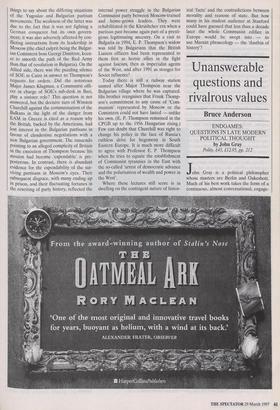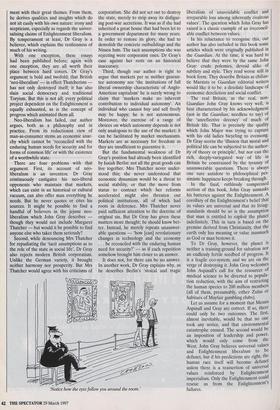Unanswerable questions and rivalrous values
Bruce Anderson
ENDGAMES: QUESTIONS IN LATE MODERN POLITICAL THOUGHT by John Gray Polity, £45, £12.95, pp. 212 John Gray is a political philosopher whose masters are Berlin and Oakeshott. Much of his best work takes the form of a continuous, almost conversational, engage-
ment with their great themes. From them, he derives qualities and insights which do not sit easily with his own nature: irony and scepticism, especially as regards the univer- salising claims of Enlightenment liberalism. By temperament at least, Dr Gray is a believer, which explains the restlessness of much of his writing.
With one exception, these essays had been published before; again with one exception, they are all worth their place between hard covers. Dr Gray's argument is bold and twofold; that British `neo-liberalism' — in effect Thatcherism — has not only destroyed itself; it has also slain social democracy and traditional Toryism. But this is not all; every political project dependent on the Enlightenment is equally exhausted, as is the concept of progress which animated them all.
Neo-liberalism has failed, our author argues, both as a philosophy and in practice. From its reductionist view of man-as-consumer stems an economic anar- chy which cannot be 'reconciled with the enduring human needs for security and for forms of common life' or with the existence of a worthwhile state.
There are four problems with that argument. First, its account of neo- liberalism is an invention. Dr Gray continuously castigates his neo-liberal opponents who maintain that markets, which can exist in an historical or cultural vacuum, can also offer man everything he needs. But he never quotes or cites his sources. It might be possible to find a handful of believers in the jejune neo- liberalism which John Gray describes — though they would not include Margaret Thatcher — but would it be possible to find anyone else who takes them seriously?
Second, while denouncing Mrs Thatcher for repudiating the 'tacit assumptions as to the role of the state in social life', Dr Gray also rejects modern British corporatism. Unlike the German variety, it brought neither harmony nor prosperity. But Mrs Thatcher would agree with his criticisms of corporatism. She did not set out to destroy the state, merely to strip away its disfigur- ing post-war accretions. It was as if she had inherited a great house that had been let to a government department for many years. In order to restore its glory, she had to demolish the concrete outbuildings and the Nissen huts. The tacit assumptions she was rejecting were corporatist ones. Dr Gray's case against her rests on an historical inaccuracy.
Third, though our author is right to argue that markets per se neither guaran- tee autonomy nor 'the institutions of full liberal ownership characteristic of Anglo- American capitalism' he is surely wrong to claim that 'markets make no inherent contribution to individual autonomy'. An individual who cannot buy and sell freely may be happy; he is not autonomous. Moreover, the exercise of a range of choices on which autonomy depends is not only analogous to the use of the market; it can be facilitated by market mechanisms. Markets are as necessary for freedom as they are insufficient to guarantee it.
But the fundamental weakness of Dr Gray's position had already been identified by Isaiah Berlin: not all the great goods can live together. Mrs Thatcher never under- stood this; she never understood that economic dynamism would be a threat to social stability, or that the move from status to contract which her reforms accelerated might also threaten our political institutions, all of which had roots in deference. Mrs Thatcher never paid sufficient attention to the doctrine of original sin. But Dr Gray has given these matters more thought; he should know bet- ter. Instead, he merely repeats unanswer- able questions — 'how [can] revolutionary changes in technology and the economy . . . be reconciled with the enduring human need for security?' — as if each repetition somehow brought him closer to an answer.
It does not, for there can be no answer. In another work, Dr Gray explains why, as he describes Berlin's 'stoical and tragic 'Notice how the eyes follow you around the room.' liberalism of unavoidable conflict and irreparable loss among inherently rivalrous values'. The question which John Gray has raised is a classic example of an irreconcil- able conflict between values.
In his reluctance to recognise this, our author has also included in this book some articles which were originally published in the Guardian. At the time, it was hard to believe that they were by the same John Gray: crude polemics, devoid alike of subtlety and style. They read worse still in book form. They describe Britain as chilias- tic Marxists or Guardian editorial writers would like it to be: a desolate landscape of economic dereliction and social conflict.
The real Britain, as the real, non- Guardian John Gray knows very well, is best characterised by his acknowledgment (not in the Guardian, needless to say) of the 'unreflective decency' of much of British life. That is precisely the quality which John Major was trying to capture with his old ladies bicycling to evensong. Dr Gray scorns the 'illusion that moral and political life can be subjected to the author- ity of theory or principle', but nor can the rich, deeply-variegated way of life in Britain be constrained by the tyranny of unanswerable questions. There is always one sure antidote to philosophical pes- simism: happiness keeps breaking through. In the final, ruthlessly compressed section of this book, John Gray unmasks his batteries against the Enlightenment. A corollary of the Enlightenment's belief that its values are universal and that its living- standards should be so is the assumption that man is entitled to exploit the planet indefinitely. This in turn is based on the premise derived from Christianity, that the earth only has meaning or value inasmuch as God or man bestows it.
To Dr Gray, however, the planet is neither a training-ground for salvation nor an endlessly fertile seedbed of progress. It is a fragile eco-system, and we are on the verge of destroying it. John Gray welcomes John Aspinall's call for the resources of medical science to be diverted to popula- tion reduction, with the aim of restricting the human species to 200 million members (all of them, presumably, either Zulus or habitués of Mayfair gambling clubs). Let us assume for a moment that Messrs Aspinall and Gray are correct. If so, there could only be two outcomes. The first, almost inevitable, would be that no one took any notice, and that environmental catastrophe ensued. The second would be an imposition of leadership and power, which would only come from the West. John Gray believes universal values and Enlightenment liberalism to be defunct, but if his predictions are right, the human race itself will become defunct unless there is a reassertion of universal values reinforced by Enlightenment imperialism. Only the Enlightenment could rescue us from the Enlightenment s failures.



































































 Previous page
Previous page